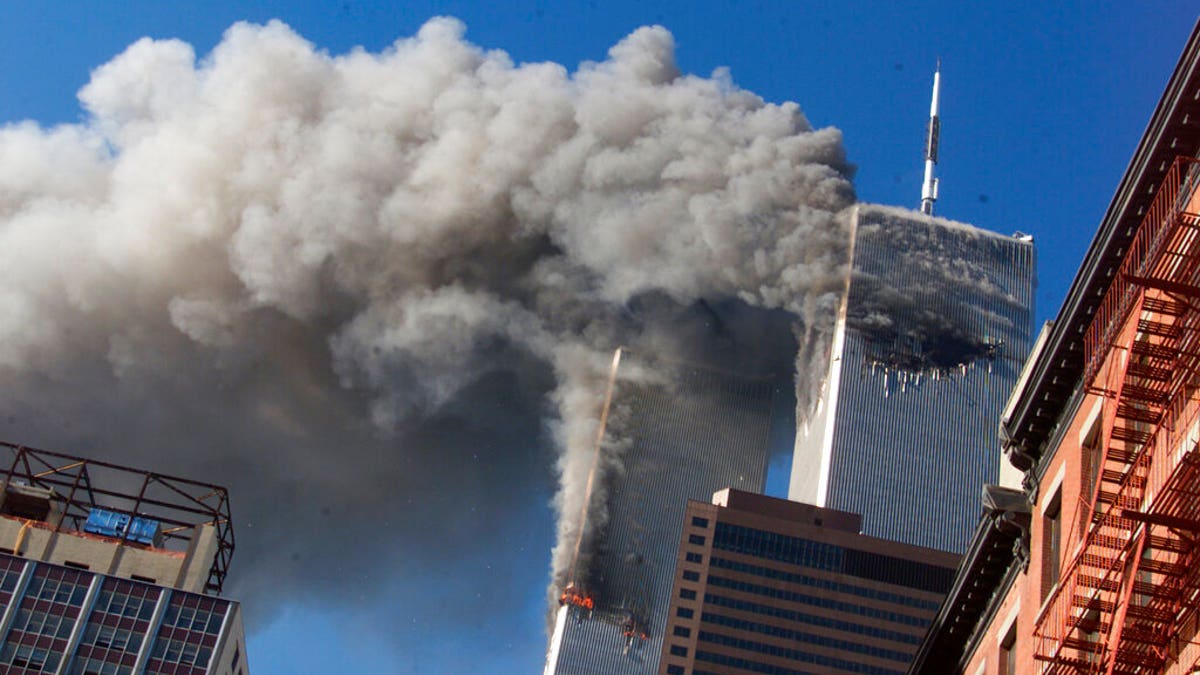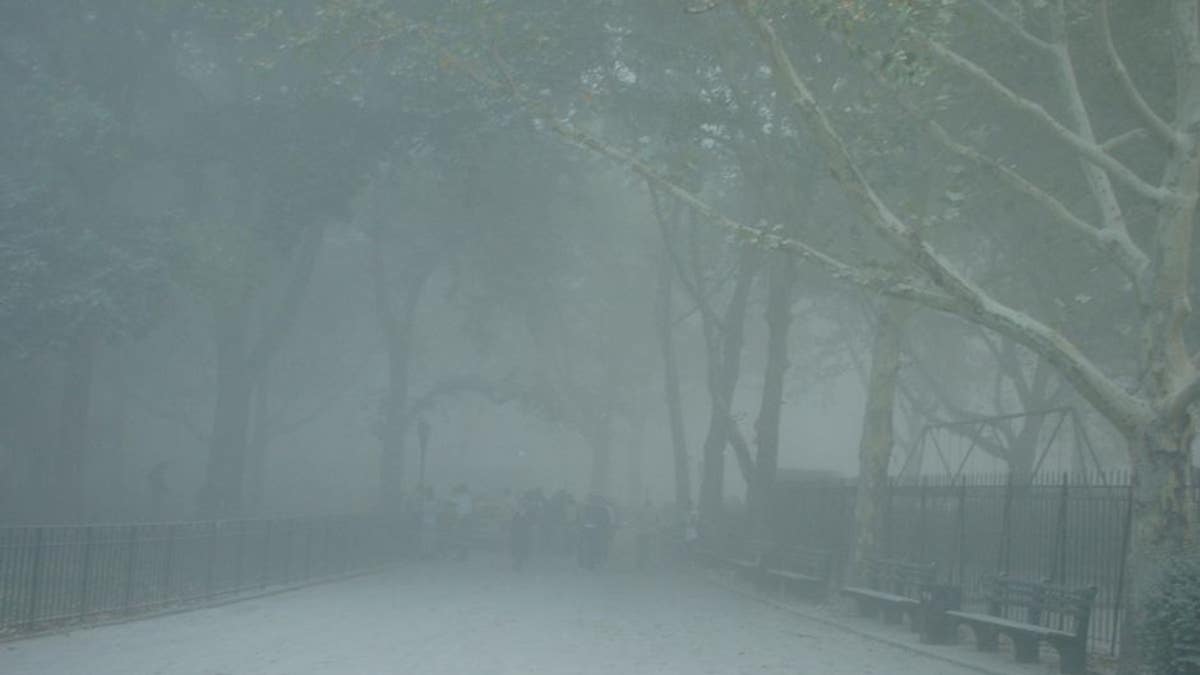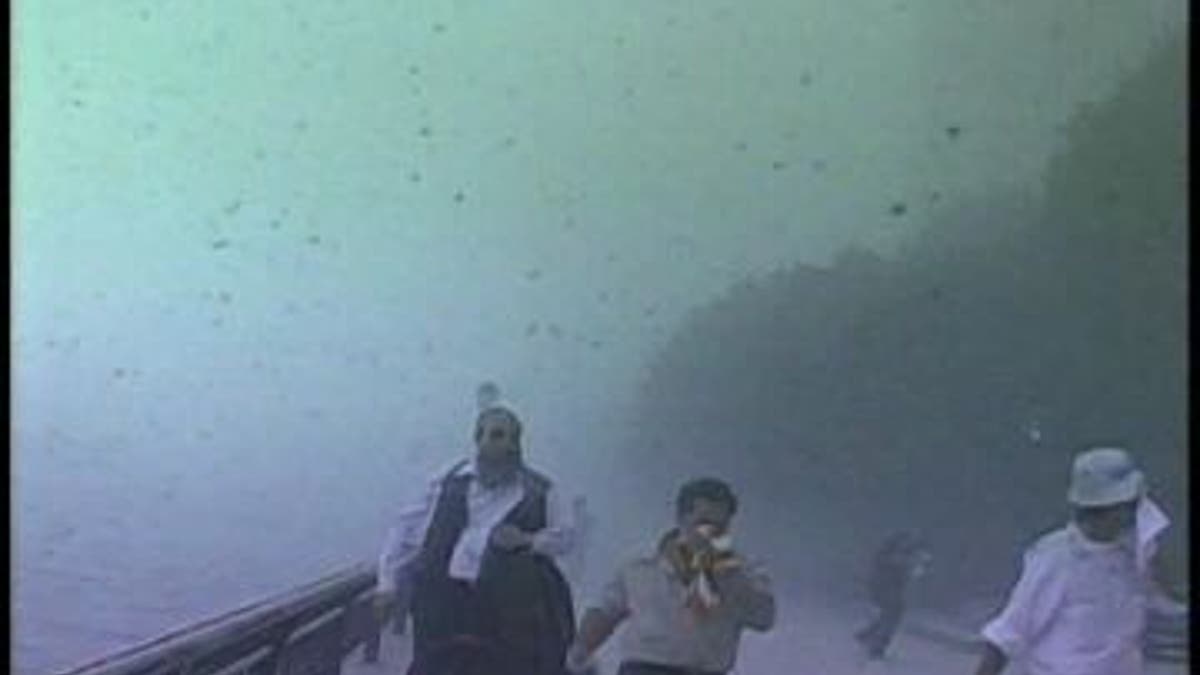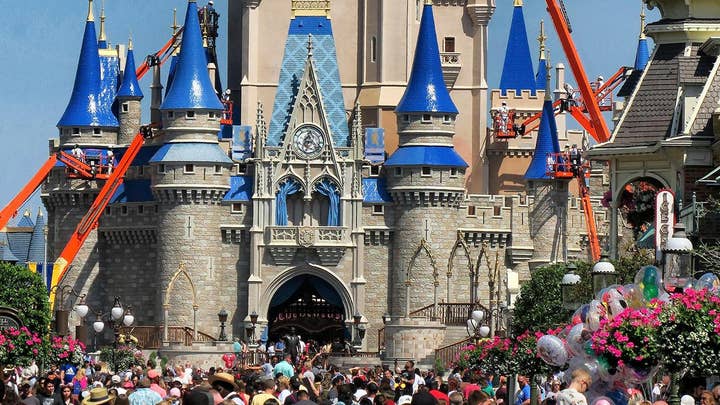Iconic Greek Orthodox church destroyed during 9/11 terror attacks resumes construction
Father of Greek Orthodox Church of America Alex Karloutsos and Friends of St. Nicholas board member John Catsimatidis on 'Fox & Friends.'
On the morning of September 11th, 2001, my husband and I stood on our balcony in lower Manhattan and watched with horror as the second plane flew right over us and exploded into the World Trade Center just blocks away.

FILE - In this Sept. 11, 2001, file photo, smoke rises from the burning twin towers of the World Trade Center after hijacked planes crashed into the towers, in New York City. The coronavirus pandemic has reshaped how the U.S. is observing the anniversary of 9/11. The terror attacks' 19th anniversary will be marked Friday, Sept. 11, 2020, by dueling ceremonies at the Sept. 11 memorial plaza and a corner nearby in New York. (AP Photo/Richard Drew, File)
The plane’s impact into the South Tower blew us back into our living with such force that I momentarily lost consciousness. Within minutes, my husband shook me awake and scooped up our dog.

Christina Stanton and her husband Brian on their apartment terrace with the Twin Towers in the background just two weeks before the 9/11 terror attacks. Courtesy: Christina Stanton
Stunned, and still wearing my pajamas, I followed him down the 24 flights of stairs out the emergency exit to the street.
Covered by dust and debris from the falling towers and struggling to breathe in a massive dust cloud, we boarded a boat that evacuated us off the island of Manhattan into the unknown.

This photo by Skot McDonald captures Christina Stanton and her husband Brian hundreds of others endured in Battery Park when the Twin Towers fell down. Stanton says, "I would call it 'caught in the dust cloud,' and it's EXACTLY how I remember it!" Photo credit: Skot McDonald
It would be months before we could return to life as we knew it in New York City.
When we escaped Manhattan in the aftermath of the attacks, I thought that would be the last time I would be forced to flee my home and the city I loved.

Battery Park on September 11, 2001. (Skot McDonald, Sept. 11, 2001)
Unfortunately, almost 20 years later, another calamity would force us to leave the city once again.
This time, it wasn’t a terrorist attack with weapons of mass destruction, it was a terrorist attack in a viral form. A coronavirus named COVID-19 had arrived, and New York City had become its epicenter.
On Tuesday, March 17th, with cases soaring and the death count rising, my husband Brian and I packed our bags and left New York for the second time in an attempt to flee the increasing threat of this invisible enemy that was closing in and closing down the city.
As we took our seats on a plane that was bound for the Southeast, we looked around the near-empty flight and felt relieved we had escaped once again. But shortly after we landed, I began to develop symptoms of COVID-19.
I never wanted to stare death in the face again having no relationship with my Creator.
Several days later, short of breath, fighting a high fever, and weak from dehydration, Brian raced me to the emergency room of a nearby hospital.
I was instantly whisked away in a wheelchair and isolated. Several hours later, my test result came back.
I was positive for COVID-19. We had escaped the city, but we had not escaped the virus.
I battled the virus alone in the hospital, facing terrifying waves of digestion issues, nausea and diarrhea, skin rashes, and erratic blood pressure.
Brian also developed symptoms, as did our extended family with whom we’d been staying. They battled at home, relying on the generosity of others to drop off meals and medicine.
Luckily, their symptoms were less serious than mine. I was eventually released from the hospital with parting words from my doctor that I only had a 50/50 chance of survival.
I spent over a month recovering, wondering if I would suffer long-term health problems and if we would ever return home.
CLICK HERE FOR THE OPINION NEWSLETTER
For the second time, we were refugees in our own country. There were so many similarities to 9/11.
Both tragedies seemed to come out of nowhere--sudden, surprising, and unexpected. In both cases, disbelief, confusion, and anger filled the headlines.
First responders raced to save lives. Ambulances tore down the streets, sirens blaring. I could only watch helplessly as both 9/11 and COVID-19 brought my city to a standstill, which grew increasingly quiet and fearful and dark in mourning.
The bustling streets emptied of pedestrians, tourists stayed away, and Times Square became a ghost town.
Stores were closed, restaurants boarded up, subways shut down, and Broadway went dark.
People retreated to their small apartments, while others evacuated and left for good.
The rhythm of life was completely altered, perhaps permanently. No one could comprehend the loss of life.
After the events of 9/11, in the words of former mayor Rudy Giuliani, the loss of life is “more than any of us can bear ultimately.”
After thousands of deaths from COVID-19, New York’s Gov. Andrew Cuomo asked, “How much is a human life worth? A human life is priceless, period.”
Both tragedies changed the way we lived.
More from Opinion
After 9/11, we had to be on guard, “If you see something say something.” Security at the airports. Building evacuations. Code Red. Code Yellow.
We would look up at the sky and watch a low flying plane and hold our breaths until the threat has passed.
The virus has also changed the way we live, how we work.
We wear masks, we wash our hands, we wonder how to travel, how to keep our families safe. The world would never be the same.
These cataclysmic events may have surprising similarities, but what shouldn’t be surprising is that they happened at all.
In the Bible, John 16:33 tells us that “in this world, you will have trouble,” and as Christians, we are not immune to these attacks or their tragic aftermaths. What we can hold onto during the storm is Jesus.
In 2001, I didn’t have Jesus.
On that fateful day of 9/11, as we watched the towers fall, we sought refuge near a stone wall in Battery Park, water surrounding us on all sides.
Believing we might not survive, we said goodbye to each other, and Brian recited the Lord’s Prayer as we bowed our heads. But it brought me no comfort. In fact, I felt defeated and petrified of what I might face in an afterlife.
At the time, I identified as a Christian, but my faith was untested, compartmentalized, and shallow.
I grew up in a Christian home, and as I got older I still went to church sporadically, but church /Christianity was a box I checked off.
I valued what “good girls” did: they went to church on Easter and Christmas, identified themselves as Christians when the need called for it and tried not to cuss too much. But otherwise went about their business.
I was in control of my life, and all I had to do was work hard in order to get the things I wanted--achieving a bucket list of accomplishments I believed were crucial for me to be happy and satisfied.
Facing death in Battery Park, none of those boxes mattered and were unhelpful and insipid in light of the very real threat we found ourselves under.
We did survive, but I spent the next 19 years exploring the Bible and who this Jesus says he is, reclaiming and deepening my relationship with Him.
I never wanted to stare death in the face again having no relationship with my Creator.
Fast-forward nearly 20 years later, I also wondered if I would live or die.
Fighting a brand new, deadly, and very unpredictable virus alone in a hospital far from home, I began to pray.
This time I knew God was with me. I heard His voice and felt His love.
The biggest difference between the two tragedies wasn’t just the tragedy themselves, but it was how I faced them.
During the first tragedy, as described in Luke 6: 47-49; my “house” was built without a foundation, and the moment a storm broke, it collapsed.
In the second tragedy, my “house” had a solid foundation built on a rock deep in the ground, and nothing could shake it loose.
It made all the difference.
We live in a broken world full of injustice and misery. And I’ve been given a gift that no one would want—the chance to speak from the inside of two of the most shattering events to hit our country in the past century. But through these experiences, I discovered that while we can’t escape suffering, there is comfort and hope in His presence in the midst of pain, God can use suffering to accomplish good, and we can trust in our sovereign God.
CLICK HERE TO GET THE FOX NEWS APP
The first time we left New York City after 9/11, we eventually returned and rebuilt our lives. This time, I’m not so sure.
Only time will tell. But what I am sure of is suffering will happen, and the only way out is through, with Christ as our guide, our hope, and our light.



